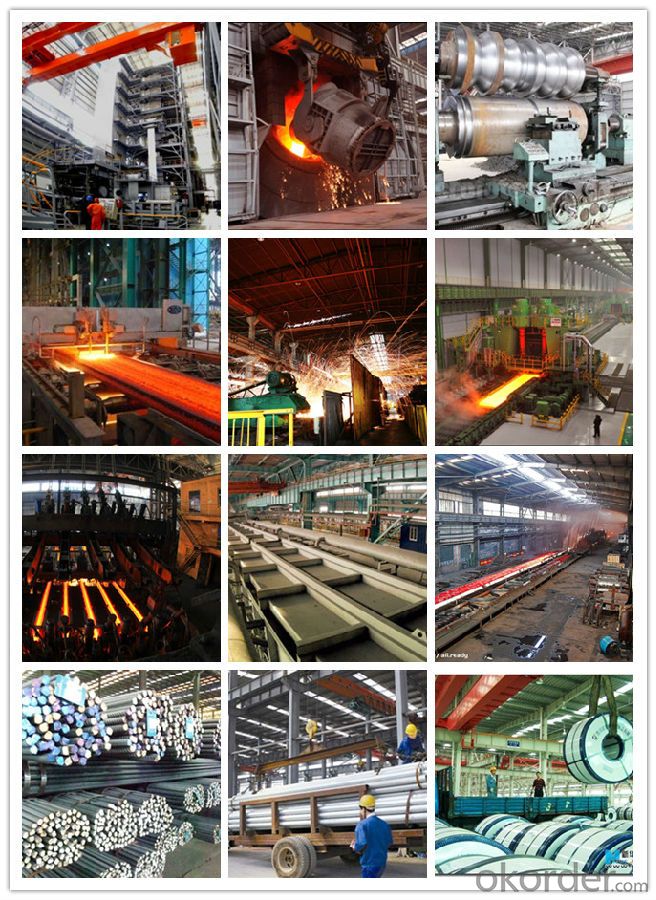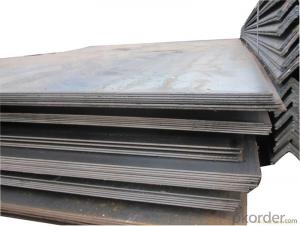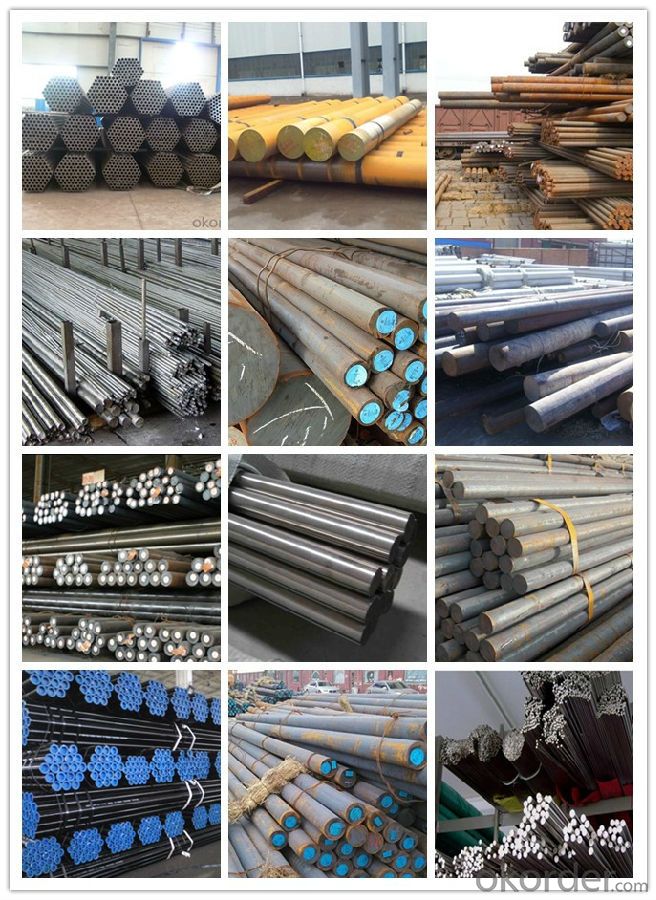Steel Sheets P20 / 1.2311 Plastic Mould Steel
- Loading Port:
- China main port
- Payment Terms:
- TT OR LC
- Min Order Qty:
- 30 m.t.
- Supply Capability:
- 10000 m.t./month
OKorder Service Pledge
OKorder Financial Service
You Might Also Like
Item specifice
1.2311 plastic mould steel description:
Chemical Composition:
C | Si | Mn | Cr | Mo | P | S |
0.28~0.40 |
0.20~0.80 |
0.60~1.00 |
1.40~2.00 |
0.30~0.55 |
≤0.030 |
≤0.030 |
Specification(Customer requested size):
Thickness: 16/18/20/25/30/35...380/385/390/395/400MM
Width: 185/225/250/255/260.../1800/2000/2200MM
Length: 2000~5800MM
Material Character:
Good mechanical property, make surface have equal harness after deal with it. Nice polishing, roughness on the surface, deal with induration in advance. It can be used directly after the mould machined, deal with surface induration necessity.
Application:
Used for various large-sized or medium-sized precision plastic mould and low melting point alloy parts, like: tin, zinc and lead alloy casting mould.
Product show
Workshop show

Shipping
1. FedEx/DHL/UPS/TNT for samples, Door-to-Door;
2. By Air or by Sea for batch goods, for FCL; Airport/ Port receiving;
3. Customers specifying freight forwarders or negotiable shipping methods!
Delivery Time: 3-7 days for samples; 5-25 days for batch goods.
Payment Terms
1.Payment: T/T, L/C, Western Union, MoneyGram,PayPal; 30% deposits; 70% balance before delivery.
2.MOQ: 1pcs
3.Warranty : 3 years
4.Package Informations: 1) EXPORT, In 20 feet (GW 25 ton) or 40 feet Container (GW 25 ton)
2)as customer's requirement
Why choose us?
(1) The leading exporter in China special steel industry.
(2) Large stocks for various sizes, fast delivery date.
(3) Good business relationship with China famous factories.
(4) More than 7 years steel exporting experience.
(5) Good after-sales service guarantee.
- Q:Can special steel be used in the recycling industry?
- Yes, special steel can be used in the recycling industry. Special steel, which is highly durable and resistant to corrosion, can be recycled and reused in various applications. It can be melted down and reprocessed to create new steel products, reducing the need for raw materials and minimizing waste in the recycling industry.
- Q:What are the different corrosion-resistant grades of special steel?
- Some of the different corrosion-resistant grades of special steel include stainless steel grades such as 304, 316, and 2205, as well as nickel-based alloys like Inconel and Hastelloy. These grades are specifically designed to resist corrosion in various environments and applications.
- Q:What are the factors that affect the mechanical properties of special steel?
- The mechanical properties of special steel are influenced by several factors, including the chemical composition of the steel, the heat treatment process, the presence of impurities or alloying elements, the microstructure of the steel, and the manufacturing process used. Additionally, factors such as grain size, hardness, tensile strength, ductility, and toughness also play a significant role in determining the overall mechanical properties of special steel.
- Q:What is the maximum temperature that special steel can withstand?
- The maximum temperature that special steel can withstand depends on the specific type and composition of the steel. However, special steels are designed to have high heat resistance and can typically withstand temperatures ranging from 800 to 1200 degrees Celsius.
- Q:How does special steel contribute to the aerospace turbine industry?
- Special steel plays a crucial role in the aerospace turbine industry as it offers exceptional strength, corrosion resistance, and high-temperature stability required for the demanding operating conditions of turbine components. It enables the production of turbine blades, discs, and other critical parts that can withstand extreme temperatures and stresses, ensuring optimal performance and safety in aircraft engines. Additionally, special steel's excellent fatigue resistance and ability to retain mechanical properties at elevated temperatures contribute to enhanced fuel efficiency and durability, ultimately advancing the overall efficiency and reliability of aerospace turbines.
- Q:How does special steel contribute to the defense industry?
- Special steel contributes to the defense industry by providing materials with exceptional strength, durability, and resistance to wear, corrosion, and extreme temperatures. These properties make it ideal for manufacturing military equipment, such as tanks, aircraft, submarines, and artillery, ensuring their reliability and long service life. Additionally, special steel's high hardness and toughness make it suitable for producing armor plates and ballistic protection systems, enhancing the safety and survivability of military personnel.
- Q:What are the different impact-resistant grades of special steel?
- Steel alloys known as impact-resistant grades are designed to withstand high impact and shock loads without fracturing or deforming. These grades of steel are crucial in industries like construction, mining, automotive, and defense, where resistance to impact and toughness are essential. Numerous impact-resistant grades of special steel are available, each with its own unique characteristics and properties. Some commonly used grades include: 1. AR400: This steel has a hardness of 400 Brinell (HB) and is highly resistant to abrasion and impact. It finds applications in bucket liners, crushers, and hoppers where wear resistance is critical. 2. AR500: With a hardness of 500 HB, AR500 steel offers even greater resistance to wear and impact compared to AR400. It is frequently used in heavy machinery, mining equipment, and armored vehicles. 3. AR600: This steel boasts a hardness of 600 HB, making it one of the toughest and most impact-resistant options. It is ideal for applications that require extreme wear resistance and durability, such as chutes, conveyors, and ballistic protection. 4. T-1: T-1 steel is a high-strength, low-alloy (HSLA) steel that delivers excellent impact resistance and toughness. It is commonly utilized in structural components, heavy equipment, and offshore drilling rigs, where high strength and toughness are essential. 5. QT or Quenched and Tempered Steels: These steels undergo specific heat treatment to enhance their toughness and impact resistance. They are popular in applications that demand high strength, toughness, and impact resistance, such as gears, shafts, and armor plates. It is important to note that the impact resistance of a specific steel grade depends not only on its composition but also on factors like heat treatment, fabrication techniques, and design considerations. Therefore, consulting steel manufacturers or experts is crucial in determining the most suitable impact-resistant grade for a particular application.
- Q:What is the significance of alloying elements in special steel?
- Alloying elements play a crucial role in special steel as they enhance the mechanical properties, corrosion resistance, and overall performance of the steel. These elements are added in specific proportions to alter the microstructure and create desired properties such as increased strength, hardness, toughness, and heat resistance. Additionally, alloying elements can improve the steel's ability to withstand extreme conditions, such as high temperatures or corrosive environments. Overall, the presence of alloying elements in special steel allows for the production of tailor-made materials that meet specific application requirements in industries such as automotive, aerospace, and construction.
- Q:How is nitrogen alloyed steel used in the production of high-strength bolts?
- Nitrogen alloyed steel is used in the production of high-strength bolts to enhance their mechanical properties and increase their strength. By adding nitrogen to the steel, it improves the hardness, toughness, and corrosion resistance of the bolts. This makes them suitable for applications that require high tensile strength and durability, such as in construction, automotive, and aerospace industries.
- Q:How long does special steel typically last in various applications?
- The lifespan of special steel can vary in different applications due to various factors. Special steel is renowned for its remarkable strength, durability, and resistance to corrosion, making it suitable for a wide array of applications. However, the actual lifespan of special steel relies on the specific application, maintenance practices, and environmental conditions it encounters. In general, special steel can endure for several decades, or even longer, when utilized in industries like construction, automotive, aerospace, and manufacturing. For example, in building structures, special steel can remain intact for 50 to 100 years due to its robustness and ability to withstand extreme loads and weather conditions. In automotive applications, special steel components such as engine parts, suspension systems, and body frames can have a lifespan of 15 to 30 years, provided they are well-maintained and not subjected to excessive wear and tear. In the aerospace industry, special steel is commonly utilized in crucial components like turbine blades, landing gears, and fuselage structures. These parts undergo rigorous testing and inspection procedures and are designed to last for decades, typically around 30 to 50 years, before necessitating replacement or refurbishment. In manufacturing processes, special steel tools and dies can last anywhere from a few years to several decades, depending on factors such as the intensity of use, the material being processed, and the maintenance practices employed. Proper lubrication, cooling, and regular maintenance can significantly prolong the lifespan of these tools. It is important to note that the lifespan of special steel can be negatively impacted by factors such as exposure to harsh chemicals, high temperatures, aggressive environments, or inadequate maintenance. Consequently, regular inspections, maintenance, and adherence to recommended usage guidelines are crucial in ensuring the longevity of special steel in various applications.
1. Manufacturer Overview |
|
|---|---|
| Location | |
| Year Established | |
| Annual Output Value | |
| Main Markets | |
| Company Certifications | |
2. Manufacturer Certificates |
|
|---|---|
| a) Certification Name | |
| Range | |
| Reference | |
| Validity Period | |
3. Manufacturer Capability |
|
|---|---|
| a)Trade Capacity | |
| Nearest Port | |
| Export Percentage | |
| No.of Employees in Trade Department | |
| Language Spoken: | |
| b)Factory Information | |
| Factory Size: | |
| No. of Production Lines | |
| Contract Manufacturing | |
| Product Price Range | |
Send your message to us
Steel Sheets P20 / 1.2311 Plastic Mould Steel
- Loading Port:
- China main port
- Payment Terms:
- TT OR LC
- Min Order Qty:
- 30 m.t.
- Supply Capability:
- 10000 m.t./month
OKorder Service Pledge
OKorder Financial Service
Similar products
New products
Hot products
Related keywords































